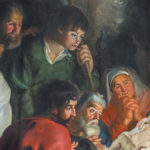Posted: 12/19/03
EDITORIAL:
Begin at the manger, but follow Jesus through his life
Do you ever wonder what became of the shepherds?
They experienced history's penultimate “Do you remember where you were when … ?” moments. (You know about lesser memorable moments: Where were you when you heard World War II was over? Where were you when you learned President Kennedy had been assassinated? When Elvis died? When the space shuttle disintegrated over Texas?)
Even 2,000 years later, we know where those Hebrew shepherds were when they received the second-best news of eternity: “And there were in the same country shepherds abiding in the field, keeping watch over their flock by night.”
How could those shepherds ever forget that night? First, an angel appeared out of nowhere, telling them the long-awaited Messiah had been born in a little town just down the road. Some of them probably lived in Bethlehem. This angel, wrapped in a tornado of light, tells them where to go to find the Savior, the Lord. Hint: Don't run down to the nearest military base; look in the barn. Chances are, the shepherds even knew the innkeeper who rented out his stable to the poor couple from over in Nazareth.
| I can't help but wonder what became of the shepherds. Did they think back to the angels and the manger and the baby when they heard the best news of all time–that Jesus rose up from the grave? |
And as if they didn't hear the first angel, an entire heavenly choir, as big and loud as the Aggie marching band, drove home the point. The angelic chorus sang words penned by the prophet Isaiah: “Glory to God in the highest, and on earth peace, good will toward men.” That had to have been the best concert in the history of music. I can't even begin to imagine, although I try. On some winter evenings, I put on my CD of Handel's “Messiah,” turn it up as loud as I can stand, and listen to a wonderful choir sing those words. The experience is so sweet and powerful and hopeful, it takes my breath away and brings tears to my eyes. And it's not even a smidgen as good as what those shepherds heard that night.
You know they didn't forget. They talked, oh yes. When Luke researched his Gospel decades later, he learned exactly what the shepherds heard and saw that night. They remembered, and they talked. They quoted all the angels word for word. Even if Jesus' mother, Mary, were Luke's source, the shepherds must have told her. And the Scriptures tell us they had left the manger “glorifying and praising God for all the things that they had heard and seen.”
Still, I can't help but wonder what became of the shepherds. Thirty years later, when a young rabbi fed thousands out of the first century equivalent of a Happy Meal, did they think about that night? When this Jesus healed the sick, preached to huge crowds and walked on water, did it remind them of the baby Messiah? Were they on the roadside during Palm Sunday? Were they–and one shudders to think it–among the crowd who screamed to Pilate, “Give us Barabas”? Did they cry when they heard young Jesus had been crucified? Did they think back to the angels and the manger and the baby when they heard the best news of all time–that Jesus rose up from the grave?
The shepherds intrigue me because they are the Everyman and Everywoman of the Christmas story. Jesus is the Messiah, of course, fully human yet completely divine. Mary and Joseph were humans, and we reverence them, but I don't know anybody who can relate to them directly. Their roles were incomparably singular. The angels were heavenly beings, the Magi rich and powerful, and Herod corrupt and powerful. But the shepherds, they were “just folks.”
So, I wonder as my mind wanders: What became of the shepherds?
I wonder about the shepherds, because the question I ask of them could–and should–be asked of us as we journey away from Christmas year after year. What becomes of us–of our relationship to this Holy Baby, who went on to live a hard yet faithful life, who suffered crucifixion for our sins, then defeated death, rising again to offer us the greatest gift of all, eternal life and never-ending relationship with God Almighty?
This time of year, well-meaning folks lament how society has taken “Christ out of Christmas.” Unfortunately, many Christians do too. When we leave Jesus in the manger, we take Christ out of Christmas. When all we think about is a sweet, cuddly baby, we take Christ out of Christmas. “Christ” means “Messiah,” and although Jesus was already God in the flesh at his birth, he didn't fully pay for the gift of our salvation until his crucifixion and resurrection 33 years later.
So, when we get caught up with the sweetness and surprise of Christ's birth at Christmas and fail to reflect upon and celebrate his entire ministry, we miss the message of Christmas.
We don't know if the shepherds kept Jesus in mind and worshipped him later. But if we embrace the Holy Baby without submitting to the Savior, and if we pack up our nativity sets and don't follow him daily throughout the coming year, we'll take Christ out of Christmas.
–Marv Knox
E-mail the editor at [email protected]












We seek to connect God’s story and God’s people around the world. To learn more about God’s story, click here.
Send comments and feedback to Eric Black, our editor. For comments to be published, please specify “letter to the editor.” Maximum length for publication is 300 words.